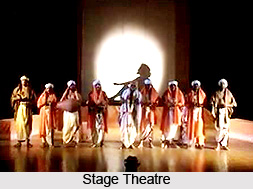 Playwrights of Amateur Stage in Kannada Theatre were the architect of the amateur stage in the Indian state of Karnataka. It has been he more than the actor and producer that is responsible for shaping the amateur stage and sustaining it, for, the script itself assumes a greater importance here than its portrayal. Production is made subservient to the theme and its realistic development. The professional pomp in play-production is missing on the amateur stage; the importance given to the individual actor and the scope provided for his histrionic talent is much less. The cry that went up for realism in settings, scenery, costumes and acting reduced the amateur`s showmanship to utter simplicity.
Playwrights of Amateur Stage in Kannada Theatre were the architect of the amateur stage in the Indian state of Karnataka. It has been he more than the actor and producer that is responsible for shaping the amateur stage and sustaining it, for, the script itself assumes a greater importance here than its portrayal. Production is made subservient to the theme and its realistic development. The professional pomp in play-production is missing on the amateur stage; the importance given to the individual actor and the scope provided for his histrionic talent is much less. The cry that went up for realism in settings, scenery, costumes and acting reduced the amateur`s showmanship to utter simplicity.
The amateur Kannada theatre stage finds no necessity for an elaborate method of make-up, nor does it provide any scope for stage-music, dance and transfer-scenes or for that matter, anything spectacular. Yet the play itself holds the audience. The miracle is performed by the playwright with his penetrating analysis of social themes, his sweep of new ideas, his intellectual humour and his simple but effective technique of play-writing itself. It is in this sense, that he is the maker of the amateur stage more than the actor and producer.
The history of the amateur stage, therefore, is essentially the story of the playwright, his way of thinking and the nature of his contributions. The Amateur stage inaugurated the age of social drama. Even the occasional mythological and historical plays bear the stamp of the new age. Its speech has come closer to the spoken word, marking a great change from that of the professional stage. The play itself shed some of its time-honoured characters like Sutradhara, Nati and Vidusaka, finding no real dramatic use for them. A new and agreeable stage of blank verse came to be employed as the vehicle for the dignified themes. The era of the amateur theatre gave a new turn to the Kannada literature for drama. It became a period of interrogation of time-honoured traditions and experiments in themes and forms. The old type of drama was soon rejected with gusto and the new, heralded with enthusiasm - plays on a great variety of topics - plays that stung and provoked the audience to a re-evaluation of long accepted attitudes, and patterns of behaviour, followed in quick succession. Almost all men of letters - be he a poet, novelist or a short story writer, tried his hand at plays. Kannada theatre soon became a force to reckon with. A look into the contributions of leading playwrights of the new era would give a picture of the amateur stage itself, its ideas and achievement.




